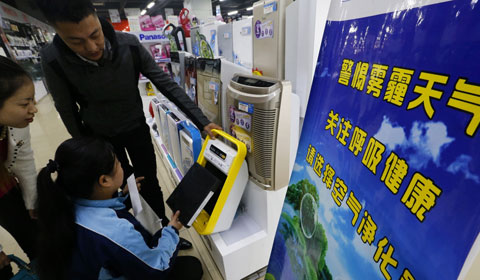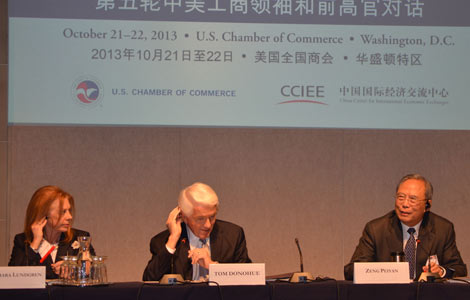China amends consumer rights law
Updated: 2013-10-25 17:26
(Xinhua)
|
||||||||
BEIJING - China's top legislature Friday passed a revision to the law on consumer rights and interests, the first time since the legislation was adopted in 1993.
A total of 150 members of the Standing Committee of the 12th National People's Congress (NPC) voted for the bill while two opposed and one abstained at its bi-monthly session, which closed here Friday. The bill has been through three readings since April this year.
The revision, focused on better protecting the rights and interests of consumers, added regulations on Internet shopping and tightened liabilities of businesses.
The revision came at a time when the country has been trying to turn domestic consumption into an engine of its economic growth.
One of the main principles of the revision is to raise confidence of consumers, said Jia Dongming, head of the civil law division under the Commission for Legislative Affairs of the NPC Standing Committee, at a press conference held after the session closed.
"If people feel safer and are more willing to spend, business will see more revenue and profit and domestic demand will expand. The whole country will benefit," Jia said.
Although the consumer rights law has played a critical role in protecting the rights of customers and maintain market order in the past two decades, there have been dramatic changes in the way people shop and the idea of consumption, he said.
The revised law not only addresses the latest changes, such as online shopping and consumers' privacy, but also long-lingering problems like the difficulties an individual customer faces to claim their rights, he added.
Prof. Liu Junhai, with the Law School of Renmin University of China, told Xinhua that the revised law has struck a balance between consumers and business as well as between justice and efficiency.
"I believe that the new consumer rights law will help build a consumer-friendly society and have significant impact on the country's tasks of transforming its economic growth pattern and promoting stability and harmony," he said.
The revised law will take effect on March 15, also known as World Consumer Rights Day.
E-SHOPPING
One of the freshest elements of the revision is about e-commerce. The revised law for the first time regulates merchandise and service transactions through Internet, television, phone and post.
In the first three quarters of the year, online retailing grossed a revenue of 1.3 trillion yuan (209.68 billion U.S. dollars) in China, equal to the annual figure of last year and up from 26.3 billion yuan in 2006, according to the Ministry of Commerce.
The new law allows e-shoppers to unconditionally return goods for refunds within seven days of transaction but requires them to pay logistics costs.
It also lists products not suitable for unconditional returns and refunds, such as digital products sold via downloads, audio-visual goods with the packaging removed, bespoke products, fresh and perishable goods, magazines, newspapers and software.
Consumers can seek compensation from online trading platforms if the platforms fail to provide valid contact details for vendors using their networks. After compensating consumers, the platforms are entitled to claim compensation from the vendors.
Leaking personal information of consumers has also emerged as a big problem.
"This revision has strict regulations on how operators should collect and use personal information and what punishment offenders will receive,which is a highlight," said Liu Junchen, deputy director of the State Administration for Industry & Commerce, also at the press conference.
The new law requires business owners to obtain consumers' consent and explicitly explain the purpose, form and scope of information use before collecting and using customers' personal information. They are banned from leaking, selling or illegally providing the information while being asked to adopt necessary technical measures to ensure security of such data.
As an implementation of the law, the administration will list leaking consumers' personal information as a category of complaints and step up cooperation with the police, the ministries of commerce and information technology to curb any offences, Liu said.

 Giant duck to exit after drawing the crowds
Giant duck to exit after drawing the crowds
 Miss Universe 2013 to be held in Moscow
Miss Universe 2013 to be held in Moscow
 Ministry to begin inspecting most heavily polluted regions
Ministry to begin inspecting most heavily polluted regions
 Spy claims stir rebuke to Obama
Spy claims stir rebuke to Obama
 Paint the world a picture
Paint the world a picture
 World's first 1-liter car debuts in Beijing
World's first 1-liter car debuts in Beijing
 Latin American clown convention
Latin American clown convention
 Prince George baptized in London
Prince George baptized in London
Most Viewed
Editor's Picks

|

|

|

|

|

|
Today's Top News
US, China broadband companies join forces
Chinatown restaurants learn how to get an 'A'
Snuff bottle 'gems' on display at Met
Beijing airport set to become world's busiest
US firms urge easier process for investment
EU to hold talks with US over spying
Wal-Mart plans to open 110 new stores
China calls for strengthened EU ties
US Weekly

|

|






